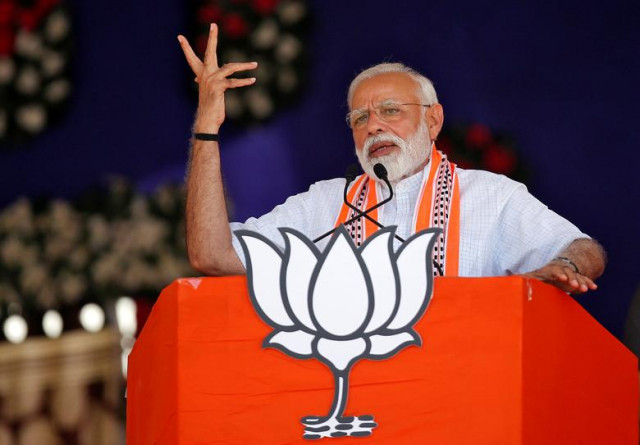The last straw
Modi’s policies are extremely dangerous for the region, especially Pakistan

Indian Premier Narendra Modi.
PHOTO: REUTERS/File
As the political wing of the RSS, the BJP has implemented the fascist Nazi-inspired RSS ideological agenda to convert India into a “Hindu Rashtriya” (state), exclusively for Hindus and “cleansing” it from the followers of “foreign” faiths, especially Muslims, whose subjugation is seen as essential for the revival of Hindu nationalism and for avenging the thousand years of Muslim “repression”. By assaulting India’s Muslim heritage with the destruction of the Babri Mosque in 1992, unleashing anti-Muslim pogroms and rewriting Indian history to denigrate Muslims, the BJP has enhanced its political clout — growing from two seats in Lok Sabha in 1987 to an overwhelming majority by 2019. From a lowly RSS karsevak (worker), Modi used fear and hate of Muslims to become chief minister of Gujarat in 2000, and after presiding over the Gujarat Massacre of over 2,500 Muslims in 2002, rose to become prime minister in 2014 — not in spite of his role but because of it. Under his watch, targeting of Muslims by Hindu fanatics has become an instrument of policy. Vigilantes have preyed on Muslims for alleged cow slaughter, marrying Hindu women and even on the suspicion of being Pakistani sympathisers. After the Babri Masjid’s destruction, other Muslim heritage sites like the mosques in Kansi and Veranasi as well as Taj Mahal are being claimed as Hindu structures. Muslim names of cities, roads and buildings — indeed history itself — is being Hinduised.
This frenzy has been raised to such a fever pitch that any opposition, even by secular Hindus, has been treated as betrayal and treason. Resultantly, all dissent has virtually disappeared with Indian officials, judiciary, media and even the armed forces becoming pliant tools of Modi’s Hindu nationalist hysteria. This has facilitated Modi’s fabrications about “punishing” Pakistan after the Pulwama incident in February 2019 and winning a thumping majority in his re-election; revoking Article 370 and imposing a lockdown for over five months in Occupied Kashmir; ensuring that the Supreme Court reward Hindu mobs for destroying Babri Masjid by awarding them the disputed site; and pushing through laws such as the Citizenship Amendment Act (CAA) which excludes only Muslims from citizenship and the National Register of Citizens (NRC), which has already been tested in Assam where nearly two million Muslims have been declared “illegal immigrants” and placed in detention camps. This law will now be applied nation-wide, placing the burden on 200 million Indian Muslims to “prove” their nationality. The result would be a purge of Muslims leading to their incarceration and expulsion. The RSS goal of a Hindu Rashtriya would then be achieved.
Modi has exposed the façade of Indian secularism. Conceived by its founders as a means of holding a disparate country together, the renunciation of secularism would lead to convulsions that would shake the foundations of India. These convulsions are now taking place — not only in Occupied Kashmir but across India itself. While brute force may subdue the current uprising, it will not win hearts and minds. The evil of communal hatred and bigotry that has been sowed by the RSS-BJP will only spread to devour the country. But Modi is unlikely to be chastened as long as the frenzied Hindu majority continues to support him.
The Indian leadership also does not feel any external pressure to change its policies. Motivated by strategic objectives and the lure of commercial profits, the self-proclaimed champions of human rights — the governments of the US and its allies — are content with issuing polite reminders about Indian “secularism and democracy” but have refrained from any action to protect the Kashmiris or Indian Muslims. Regrettably, even most Muslim countries have remained silent bystanders.
But Modi’s policies are extremely dangerous for the region, especially Pakistan. After the action in Assam, Muslims in India’s north-east may be pushed into Bangladesh and Myanmar while others may be forced to flee to Afghanistan, and particularly Pakistan. As Prime Minister Imran Khan has highlighted this could lead to a new refugee crisis. He has also raised a more dire possibility that in order to divert attention from his domestic crisis, Modi may use a false-flag operation to launch an attack across the Line of Control (LoC) or the international border. The Indian army chief has already implicitly threatened as much and Indian violations of the LoC have increased. In case of any Indian aggression, Pakistan is bound and ready to retaliate.
Pakistan has also raised its concerns with the international community and should further intensify these diplomatic efforts in the relevant international forums and in bilateral contacts, especially with the major powers and Islamic countries. In doing so, Pakistan should invoke the Liaquat-Nehru Pact of 1950, which recognises the right of both sides with respect to the welfare of minorities in either country. As such, the treatment of Indian Muslims is not just an “internal” matter for India but an issue in which Pakistan has a legitimate stake, as it does regarding Occupied Kashmir. It is, therefore, Pakistan’s moral duty and legal right to come to the defence of Indian Muslims and the Kashmiri people.
Published in The Express Tribune, January 11th, 2020.
Like Opinion & Editorial on Facebook, follow @ETOpEd on Twitter to receive all updates on all our daily pieces.













COMMENTS
Comments are moderated and generally will be posted if they are on-topic and not abusive.
For more information, please see our Comments FAQ